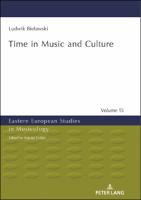Time in Music and Culture
Abstract
From Aristotle to Heidegger, philosophers distinguished two orders of time, before, after and past, present, future, presenting them in a wide range of interpretations. It was only around the turn of the 1970s that two theories of time which deliberately went beyond that tradition, enhancing our notional apparatus, were produced independently of one another. The nature philosopher Julius T. Fraser, founder of the interdisciplinary International Society for the Study of Time, distinguished temporal levels in the evolution of the Cosmos and the structure of the human mind: atemporality,prototemporality,eotemporality,biotemporality andnootemporality. The author of the book distinguishes two ‘dimensions’ in time: the dimension of the sequence of time (syntagmatic) and the dimension of the sizes of duration or frequency (systemic). On the systemic scale, the author distinguishes, in human ways of existing and acting, a visual zone, zone of the psychological present, zone of works and performances, zone of the natural and cultural environment, zone of individual and social life and zone of history, myth and tradition. In this book, the author provides a synthesis of these theories.
Keywords
2015; Akademii; Bielawski; Culture; Czas; Folk Music; Instytut; kulturze; Music; muzyce; Nauk; Polskiej; Psychological Present; Space; Sztuki; Temporality; Time; Time Zones; Warszawa; ZonalityDOI
10.3726/b15917ISBN
9783631791226, 9783631791233, 9783631791240, 9783631790618, 9783631791226Publisher website
https://www.peterlang.com/Publication date and place
Bern, 2020Series
Eastern European Studies in Musicology, 15Classification
Theory of music and musicology
Traditional and folk music
Folk, Folkloric styles
Philosophy
Social and cultural anthropology


 Download
Download